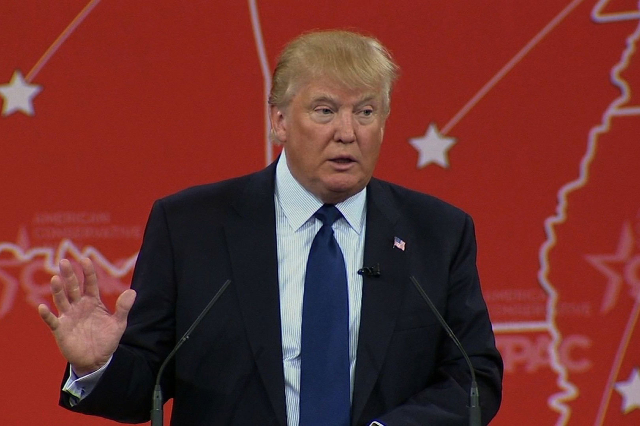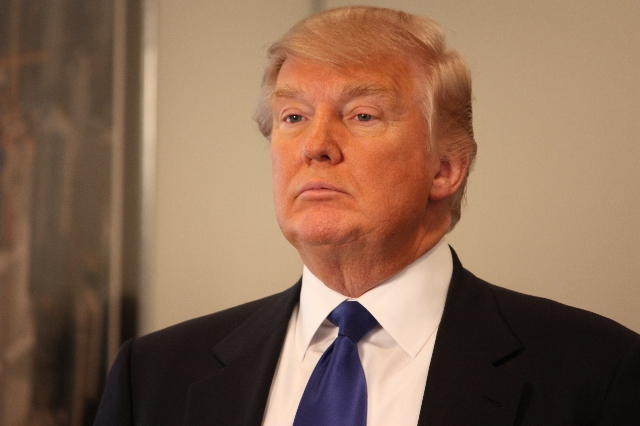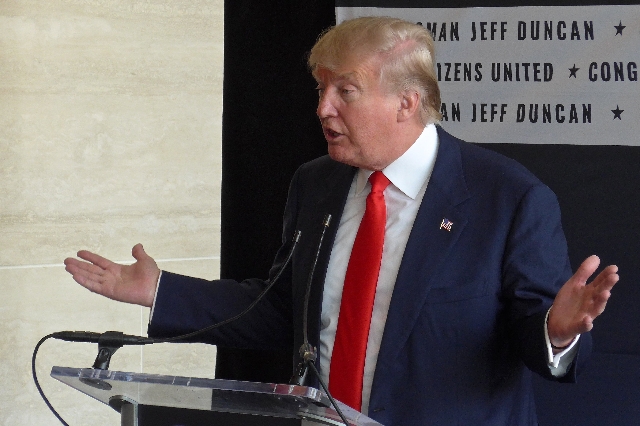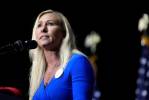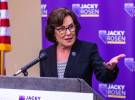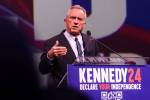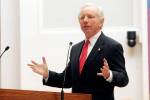Will Trump’s poll numbers become votes?
WASHINGTON — First he defined the "Art of the Deal." Now he seems determined to redefine the art of politics. But no one has ever won the presidency playing the game like Donald Trump.
And Trump is not just breaking all the rules as he rips through the Republican field like a tornado. The billionaire construction mogul will shatter the conventions of presidential campaigning if his unrepentant, antagonistic media tour leads to the Republican nomination.
He's made a boastful evisceration of Beltway wisdom on how to run for president the entire rationale of his campaign — and six months before first votes are cast, he is winning. He leads national polls, topping early voting state surveys Tuesday, and has sidestepped the kind of ugly controversies and policy flip-flops that have felled other candidates.
But questions are gathering around the unlikely GOP front-runner, despite his success in confounding pundits and his display of unforeseen political instincts that have forced the media to treat the bombastic reality show star they once viewed as a punch line as a genuine White House contender.
In particular: Just how long can The Donald keep this up?
Can a campaign prospering at the intersection of politics, celebrity and self-publicity with an incendiary social media strategy exploiting public disdain for establishment politicians sustain momentum through the six long months before the first nominating votes are cast?
"Campaigns are not going to be won and lost on Twitter," said John Sides, co-author of "The Gamble," a new political science study on the 2012 presidential campaign.
"(Campaigns) are going to be won and lost in part because you have an organization, and you are deploying those resources in fairly ordinary ways — knocking on doors to buying television advertisements," he continued.
Trump's short but explosive campaign has so far made clear that he does have attributes that many more conventional candidates long for — an ability to command media attention at will, enviable name recognition, a unique personal brand, a vast fortune that can finance his presidential aspirations and a knack for inserting himself into simmering political controversies.
But for all Trump's genius in manipulating the media, it's almost inconceivable that an insurgent like him can beat the political establishment of a major political party and win its nomination without mastering the political tools of the establishment itself — the more prosaic skills of mustering supporters at the grass-roots to head to the polls and satisfying diverse state rules for getting on the ballot, for instance.
Fusing organization with inspiration
Successful political campaigns involve a fusion of organization with inspiration. Vast nationwide structures and state-specific teams are needed to shepherd a candidate through the months up to and through successive nominating contests.
The contrasting fates of President Barack Obama, who mastered grass-roots organizing, and Hillary Clinton, who didn't, in their 2008 Democratic primary clash proved that the charisma of a rock star candidate — on which Trump overloads — is not enough.
Eventually, candidates need to be underwritten by a solid policy operation, an expansive grass-roots network and a strategy to identify voters precinct by precinct and drive them to the polls on cold winter nights in ice-bound Iowa and New Hampshire.
In Trump's case, it remains unclear whether his campaign can continue to thrive on his bombastic personality alone. No one yet knows whether Trump will commit to building the vital infrastructure of a genuine political campaign, which typically needs an advertising strategy, intricate polling data, get-out-the-vote operations and rapid-response war rooms staffed by political veterans.
"He has hired several consultants in places like Iowa and South Carolina, but it is not as professional as the likes of (Jeb) Bush's campaign or Marco Rubio's," said Sean Cain, a professor at Loyola University who has studied Trump's political infrastructure by examining Federal Election Commission records.
"It seems that he has the type of campaign structure that is not going to get him too far," Cain said. "He really needs to have, not a national news presence, but a national organization made up of the types of human resources and personnel that a winning campaign needs."
Trump's Iowa state director, Chuck Laudner, said that, despite a staff shakeup, the campaign would build a professional ground game, though it did not need "an army of consultants," CNN reported Tuesday. The billionaire has 10 staffers in Iowa and is in the process of building state operations elsewhere.
But unless that effort expands significantly, it's possible that breaking the rules of conventional politics — the strategy that took Trump to the top of the GOP field and secured his starring role in early television debates — could prove to be his downfall.
That's one reason few political watchers in the ranks of consultant shops, academia or journalism expect him to actually win caucuses or primaries — even though his unlikely presidential campaign has already repeatedly defied predictions by pundits of an imminent implosion. Stunning attacks on Sen. John McCain and Fox News host Megyn Kelly are just two of those he's seemed to weather.
A campaign without structure?
Costas Panagopoulos, head of the campaigns and elections program at Fordham University, said any serious political campaign needs structure.
"I don't see much structure in the Trump organization as is evident in other Republican campaigns at the moment or in previous campaigns for president." He added, "There is only so far a candidate can go as a one-man show."
Trump's answers to such critiques have so far been to point out, correctly, that he has defied conventional wisdom time and time again.
He says he's simply bigger, better and smarter than anyone else, implying that the rules constraining normal political mortals simply don't apply.
"I know policy better than anybody. I know politics as well as anybody," Trump said on CNN's "New Day" on Tuesday.
"I am not a politician. Politicians are all talk and no action," he said. "I'm the opposite."
Trump may have more leeway on this area than a conventional politician owing to his money and celebrity, and it's already clear that he has succeeded in one of the most important tasks of a presidential campaign — presenting an authentic version of himself and his political brand to voters.
Mitt Romney, the 2012 GOP nominee, by contrast ran for president twice and never seemed to master that elementary but vital imperative.
And given that he's leading the polls, Trump may have a case for sticking with what works.
In a poll published by Suffolk University on Tuesday, Trump was the clear leader in Iowa, ahead of Wisconsin Gov. Scott Walker by 17 percent to 12 percent . He led former Florida Gov. Jeb Bush in a Boston Herald/Franklin Pierce University poll in New Hampshire by 18 percent to 13 percent . In the latest CNN Poll of Polls, Trump led his nearest rival, former Florida Gov. Jeb Bush, by 10 points.
But there are danger signs for Trump, who has yet to prove he could lift his support above the 30 percent level to make the case that he is a more viable candidate.
While he is the undisputed front-runner right now, his position is atop a huge Republican field — a factor that is splitting opposition against him.
There's no guarantee that when the field contracts, that support will flow his way. And currently, a strong majority of Republican voters — around three in four — still prefer someone else.
Recent electoral history also suggests that leading the pack of GOP presidential candidates in the summer before nominating contests open is a recipe for political obscurity.
Polls that didn't pan out
In 2012, GOP candidates like former Texas Gov. Rick Perry, pizza magnate Herman Cain and Rep, Michele Bachmann all basked in state and national poll leads but fell back once their booms played themselves out.
All suffered what Sides, a professor of political science at George Washington University, and his co-author Lynn Vavreck identify as a pattern for outsider candidates in presidential races.
In a cycle they called "discover, scrutiny and decline," each candidate rocketed to prominence on the back of favorable media coverage, then came under scrutiny over their records or perceived gaffes and dipped in the polls.
Trump has experienced an explosion of media coverage after launching his campaign with a prolonged rant of an announcement speech in June — but, though his record is beginning to be scrutinized, he has yet to submit to a full examination of his character, political platform and past.
Such a grilling is sure to come, especially for a candidate who has no history in elected office or of policymaking and who hardly fits the mold of conservatives preferred by grass-roots GOP activists who participate in primaries.
One reason Trump has succeeded with his act so far is that his media dominance has made it difficult for another candidate to emerge and steal the narrative, as Sides' research suggests often happens to a front-runner.
But given the political media's thirst for new story lines, even a publicity hound like Trump seems likely to become old news at some point.
There are also other potential pitfalls for Trump. Right now, it may make sense for him to remain vague on what exactly he would do as president — framing policies often makes political enemies — but that approach isn't likely to be sustainable.
"I know exactly what I want to do, I just don't want to announce it yet," Trump told CNN's "New Day" on Tuesday in a typical dodge, when asked how he would reform the tax code.
He's so far preferred to deal in inflammatory generalities rather than wonkish specifics, promising to build a wall to keep out illegal immigrants and send Mexico the bill and proposing to "knock the hell" out of ISIS without offering a clear strategy.
A demand for policy specifics
But sooner or later, the discerning conservative voters of Iowa and New Hampshire — not to mention his political opponents and the media — will demand more details.
"Many (people) don't mind the way he's talking about the issues in a broad picture, he's getting the concepts out there," said Amy Showalter, an expert in political action committees and grass-roots organizing.
But Trump will soon have some explaining to do if he wants to continue gaining additional support, she said. "A conventional political operation will become more and more necessary the farther he goes."
It's not unusual at this stage of a presidential campaign for candidates to lack specific proposals as they instead seek to communicate a broad message to the public.
But there's an expectation among voters and the media that they will begin to roll out detailed policies as the process goes along — Democrat Clinton, and Republicans Bush and Florida Sen. Marco Rubio, for instance, are making regular in-depth speeches on domestic and foreign policy.
That step toward becoming a conventional politician might strip Trump of much of his anti-politics appeal among disgruntled supporters. But the alternative could be just as strong a liability.
As the first voting contests approach early next year in Iowa and New Hampshire, Trump may find it more difficult to shake off pressure in presidential debates and candidates' forums to lay out exactly what he would do as president.
If he remains a key player at that point, sustained attacks are also likely to be supplemented by outside super PACs and third-party groups, which could make an organized political structure to defend him a necessity. And for all Trump's statements of his vast personal wealth, such a firewall does not come cheap — opening the possibility that at last he will be forced to undertake some formal fundraising.
The daunting obstacles facing Trump, despite his early success, are one reason why many of his rivals seem content so far to let him prolong his moment in the spotlight, half a year before polls really begin to count.
"When you are dealing with a tornado or a hurricane, you mostly just have to let it pass," Tim Pawlenty, the former Minnesota governor and GOP presidential candidate, told CNN on Tuesday.



